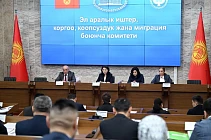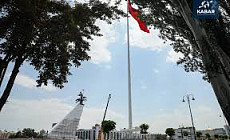Tolkunbek Abdygulov, chairman of the National bank: «Kyrgyzstan and China are ready to som-yuan system, but the last word is up to business»
Proposal of Kazakhstan to SOC countries to move to national currency in mutual settlements and shift fr om the dollar puzzled financial regulators of member-countries of the Organisation. Will the system be beneficial for domestic business and our citizens, who are used to keeping their capital in the american currency.
- Kazakhstan made an offer for SOC countries to carry out settlements only in national currencies, excluding dollar. Is it advantageous for Kyrgyzstan to carry out foreign-trade operations not in dollars, and how will it impact stability of the som?
- On the whole the transition in bilateral trade to national currencies is beneficial, since the third currency is ruled out. From the point of view of monetary policy, in terms of som’s stability, there are no objections. The main positive moments are that, switching in foreign-trade operations among SCO countries to payments in national currencies will decrease dollarization of our economies, and minimize currency risks. However, one must not forget, that the business should be ready first for this. We and China are ready to «som-yuan» system, but are businessmen ready for that? How will the business react? How far exporters and importers are ready to work in som-yuan system?
International decisions - are a brick in a foundation, implementation of such decisions – is a gradual process. But in general the direction has been chosen correctly. The National bank of Kyrgyzstan is ready to provide an opportunity to work in «yuan-som» system, but, I repeat, the business should decide itself, what is profitable for it. After all the dollar often fulfills the function of savings for people. Banking system has deposits and loans in dollars. And the stability of both national currency, and currency of the trade partner will weigh on decision of the business.
- The financial regulator, admittedly, suggested a program to the government to stimulate export-oriented sectors of the economy. How much money is planned to be invested into the program and from what sources?
- Yes, it is true, the National bank developed and proposed program to the government on stimulation of export-oriented sectors of the economy. The aim of the project on the one hand is to maintain growth of the economy, on the other hand – to secure flow of freely convertible currency into the country, which will in the end ensure stability of the national currency.
The national bank presented the project of the program at a session of coordination council on macroeconomic and investment policy together with main players of the economic block of the government. As a result there has been adopted a joint decision, the government will seek for funds to realize the program, and the bank will work on figuring out interest rate for final buyers. It should be noted, that successfull realization of the program «Financing of export-oriented production» will take common efforts and need participation of all state bodies.
The amount of funds on the program, which the National bank is ready to grant to banks for further financing, will depend on the capability of finance ministry to find funds to subsidize interest rates of commercial banks, so that it would be favourable for final borrowers.
The National bank is a lender of the last intance for financial system of the country, as well as an advisor of the government, therefore it can not stay aside from economic processes occuring in the country. In the near future the government will be submitted proposals on fiscal stimulation of the economy to attain aims of the National sustainable development strategy for 2013-2017.
- The National bank put forward a bill for public discussion banning private exchange offices, and leaving bank exchange offices. Are you sure it will lead to reduction of speculation?
- Yes, the National bank offered to eliminate activities of exchange offices. The motive was a speculative attack on the national currency in December 2014. During three weeks the situation in currency market has been stable, dollars in the banking system were enough, both cash and non-cash. I.e objective prerequisites to raise currency rates were absent. But owners of exchange offices took an advantage of the unstable situation in the currency market of Russia and made fortunes on it.
Presence of exchange office are not causing obstacles, but I want to remind their nature. They make money in mediatory services, and when there arises an opportunity to get rich faster, then they are hard to be stopped. In this case, the banking system is more transparent, licencing procedures and control of financial institutions are more tougher.
Amid the last events, hapenning in the currency market of the country, the National bank between January and November 2014 inspected over 1200 exchange offices throught the country. There were uncovered law breaches, they were absence of identification of clients, concealing real volumes of operations and of course provision of incorrect information to the National bank.
The National bank in the framework of its authority last year withdrew licences of 15 exchange offices, suspended activities of 129 exchange offices, as well as sent 16 warnings and 220 warrants.
Currently the bill was brought to public discussion, in January the National bank will hold roundtables, wh ere opinions of all interested sides will be heard and discussed.
- Will there be not «revenge» for closing the market?
- One of the main tasks of the National bank is to maintain purchasing power of the national currency, provision of effectiveness, safety and reliability of banking and payment system of the country. Behind the implementation of this task are not only interests of whole country, but interest of every citizen, almost 5.5 mln kyrgyzstanis.
The proposed amendments to legislation will enable, first, to effectively unmask people, who carry out their activities without licences and timely react to them, second, there will not be prerequisites for panicking among population in case of exchange currency fluctuations.
- At the beginning of the last year rate of the dollar jumped, are there not prerequisites, that it will happen this year?
- One must look into root of the reason. In 1Q of 2014 people were panick-striken over the tenge devaluation and they began to buy dollars. After several month the rate dropped down to 53-54 soms per dollar, and those, who bought the currency upon the agiotage, go broke. In such cases, only people are losing, unlike investors they can not keep purchased currencies for 3-4 months. After all they have to sell dollars , since they need soms to pay for utility services, taxes, shoppings and other things.
We have not prerequisites to step on the same rake of the previous year. We use all instruments of monetary policy to hold the national currency, regularly keeping our eyes on foreign markets and domestic currency market.
- To what degree the National bank can spend its international currency reserves? To what rate can Kyrgyzstan lower rate of the som?
- According to world experience, it is ok to count acceptable that rate of international reserves, which covers 3 months of future import of goods and services of the country. Meanwhile each country itself determines optimal level of its gold and currency reserves, based on its own goals and tasks of macroeconomic policy.
Many flogged, that the National bank in December sold 84 mln US dollars, but $30 mln of them were paid for electricity imported from Kazakhstan, asl well as for imported petroleum.
The National bank constantly evaluates the necessity of intervention, and depending on circumstances and situations in economy decides to apply international reserves to intervene the currency market, but this is only part of monetary policy.
- What steps will be taken to lower infation growth except lifting interest rates?
- To keep inflation in 2014 the National bank regularly had used various instruments of monetary policy. In particular, were raised: interest rate from 6% to 10.5%, rates of monetary policy instruments: in loan «overnight» from 5% to 11%, in deposit «overnight» - from 1% to 4.50%. currency interventions allowed to sterelize 28 bln soms, also it decreased monetary component of inflation.
Statistical data of 2014 show that rates of economic growth of Kyrgyzstan are going on to slow down, the same scenario is observed in other countries – main trade partners of Kyrgyzstan. Foreign trade operations have fallen. Remittances shrank, but their volume continue to grow. Above mentioned factors are one of the reasons of high pressure on domestic currency market of the country, certainly, on level of inflation.
The national bank will go on to monitor the situation in the economy of the country, in accordance with legislation will take necessary measures of monetary policy, aimed at holding inflation at 5-7% in short term, according to main directives of NBKR in short term period.


